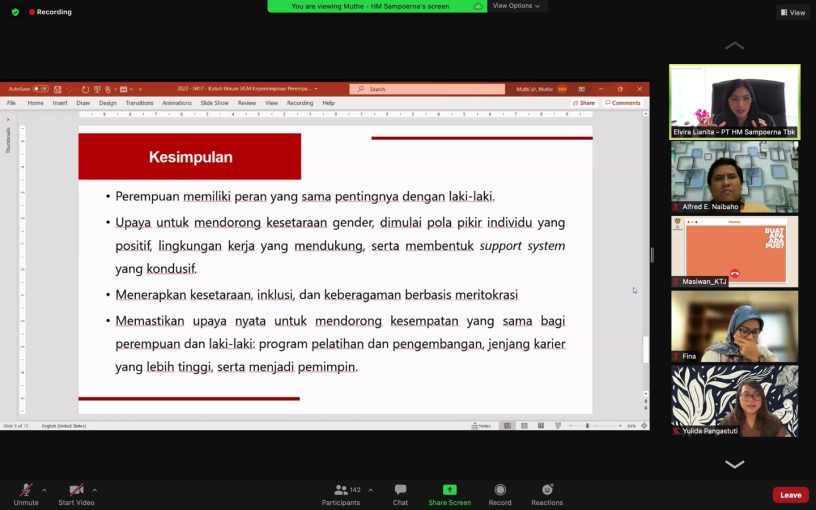
Yogyakarta, April 18th 2022─The Department of Sociology, Social and Political Sciences UGM in collaboration with the Department of Women’s Empowerment, Child Protection and Population Control DIY held the Second Series of Public Lectures on Women’s Leadership and Social Transformation on Monday (18/4). This online activity via Zoom raised the topic of “Women’s Leadership in the Public and Private Sector”. The speaker that was invited on this occasion was Safira Rosa Machrusah as the Indonesian Ambassador to Algeria and Elvira Lianita as the External Affairs Director of PT HM Sampoerna Tbk.
Through her presentation, Elvira explained that gender equality in Indonesia and globally is still not achieved. A number of studies show that the representation of women at the management level in the private sector is still not fulfilled and even very minimal. Based on the research by the World Economic Forum, Indonesia is still ranked 101 out of 156 countries for gender equality.
“This shows that in general, the role of women must be advocated more, and in the current government, I see that there has been a change. Now, the government puts women’s development programs as one of the priorities in the national mid-term development plan for 2020-2024,” said Elvira.
Furthermore, women’s leadership in both the private and public sectors is very important for the welfare of the nation. Based on the research by the McKinsey institute in 2018-2021, women’s leadership is able to create a healthier, egalitarian organization, and produce comprehensive and inclusive decisions since decisions are informed by various perspectives from multiple sectors.
“This is why women’s decisions to play a greater role in the public and private sectors are important. We now know that not only is it the right step, but research also proves that the results will be much better if women hold a more equal position in decision making,” said Elvira. .
Additionally, Safira also revealed that in terms of building relationships, female leaders are consistently rated higher than their male counterparts. “Since they are skilled in building relationships within the home, women are also very likely to be successful in building relationships outside,” says Safira.
Gender inequality exists due to gender stereotypes in which women are often considered to be less capable than men. In addition, women who have the role of working mothers who take care of the household are not considered as a ‘strategic investment’ because they are considered too vulnerable in their position in a company. Therefore, as women are required to be able to divide their time between being a mother and holding a job, a job environment that accommodates women’s role is needed.
